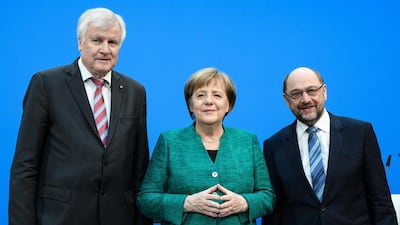Angela Merkel, Germany’s indomitable leader for 13 years, has been forced to hand control of key ministries to her political rivals in a long-awaited coalition deal that highlights her waning power at the helm of Europe’s strongest economy.
The agreement will see Mrs Merkel – once dubbed the Iron Chancellor – continue with a fourth term in power but leave her long-term position uncertain after the worst political crisis of her tenure.
The coalition deal ends more than four months of political limbo in Germany sparked by the poor showing of the country’s two biggest parties in national elections last year following a surge in support for nationalists.
The left-of-centre Social Democrats (SPD) claimed the prized finance portfolio in a new grand coalition deal settled on Tuesday, a ministry that will be key to driving reforms in the European Union’s single currency eurozone. The SPD will also run the foreign ministry.
In her first public comments since the deal, Mrs Merkel said many conservatives would not be happy with the handover of the ministry to the SPD.
The deal also sees Mrs Merkel’s party lose the interior brief to its Bavarian sister party the Christian Social Union (CSU). Its leader Horst Seehofer, an outspoken critic of Mrs Merkel’s liberal migration policies, is tipped to take the position.
The giveaway of key ministries is a sign of how desperately Mrs Merkel needed to strike a deal to prevent another election or leave her at the helm of a minority government, said analysts.
While it ensures her position at the head of the coalition, she had to make the deal attractive enough for traditional rivals the SPD and its members to back. The SPD’s 464,000 members still have vote on the deal with many publicly voicing their disapproval of the renewal of the coalition that has ruled Germany since 2013.
“She had to give away a lot of goodies to make sure it happened,” said Leopold Traugott a policy analyst for the Open Europe thinktank. “She definitely wants to do the full term… but it’s clear to everyone it’s the last term for Angela Merkel.”
_______________
Read more:
German parties extend coalition talks still unable to reach agreement
Germany coalition deadlock broken after apparent refugee deal
_______________
Even if she lasts a full four-year term, her Christian Democratic Union (CDU) party will intensify its planning for a successor, with no obvious candidate to take over, said Mr Traugott. She has already come under criticism from outside of the country after skipping an EU summit attended by most leaders to try to finalise the deal.
Mrs Merkel was pushed into striking a deal with the CSU and the SPD after attempts to form a government with two smaller parties failed in November.
SPD leader Martin Schulz – who had previously ruled out renewing the grand coalition – changed tack and used Mrs Merkel’s weakness to secure a decent deal for his party, said analysts.
Mr Schulz is expected to quit the leadership of his party to run the foreign ministry, which was also controlled by the SPD during the last coalition from 2013.
The main prize will see the SPD mayor of Hamburg, Olaf Scholz become finance minister, signalling a probable move away from austerity measures championed by his predecessor Wolfgang Schaeuble.
Mr Scholz is, however, seen as a pragmatist who is unlikely to take the ministry on a radical new course.
The SPD could steer Germany closer to the European integrationist policies of French leader Emmanuel Macron at a time that the European Union is set for reform with the departure of the United Kingdom.
"What we wrote down in this coalition agreement about the European Union and its future will be a fundamental change of direction in Europe," said Mr Schulz. "With this coalition agreement, Germany will take an active and leading role in the European Union again.”
The SPD will also run the labour, justice and environment ministries, according to Germany media reports.
The breakthrough over the division of ministries followed a marathon 24-hour negotiating session. News of the deal came after SPD negotiators with a posting on social media. “Tired but happy. There is a treaty! Finally,” the post said.
A key stumbling block was overcome last month after the parties agreed a deal over immigration that would allow at least 1,000 family members of refugees into the country every month from August.
Migration has emerged as one of the most difficult issues in the talks with the Social Democrats pushing for a more lenient policy on reuniting the families of people who fled war in Syria and Iraq.


